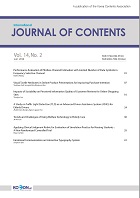- Log In/Sign Up
- P-ISSN1738-6764
- E-ISSN2093-7504
- KCI
 ISSN : 1738-6764
ISSN : 1738-6764
Exploiting Patterns for Handling Incomplete Coevolving EEG Time Series
(Carnegie Mellon University)
Abstract
The electroencephalogram (EEG) time series is a measure of electrical activity received from multiple electrodes placed on the scalp of a human brain. It provides a direct measurement for characterizing the dynamic aspects of brain activities. These EEG signals are formed from a series of spatial and temporal data with multiple dimensions. Missing data could occur due to fault electrodes. These missing data can cause distortion, repudiation, and further, reduce the effectiveness of analyzing algorithms. Current methodologies for EEG analysis require a complete set of EEG data matrix as input. Therefore, an accurate and reliable imputation approach for missing values is necessary to avoid incomplete data sets for analyses and further improve the usage of performance techniques. This research proposes a new method to automatically recover random consecutive missing data from real world EEG data based on Linear Dynamical System. The proposed method aims to capture the optimal patterns based on two main characteristics in the coevolving EEG time series: namely, (i) dynamics via discovering temporal evolving behaviors, and (ii) correlations by identifying the relationships between multiple brain signals. From these exploits, the proposed method successfully identifies a few hidden variables and discovers their dynamics to impute missing values. The proposed method offers a robust and scalable approach with linear computation time over the size of sequences. A comparative study has been performed to assess the effectiveness of the proposed method against interpolation and missing values via Singular Value Decomposition (MSVD). The experimental simulations demonstrate that the proposed method provides better reconstruction performance up to 49% and 67% improvements over MSVD and interpolation approaches, respectively.
- keywords
- Multivariate Time Series, Electroencephalogram (EEG), Handling Missing Values, Interpolation, Linear Dynamical System, Kalman Filter, MSVD, Expectation maximization.
- Downloaded
- Viewed
- 0KCI Citations
- 0WOS Citations

